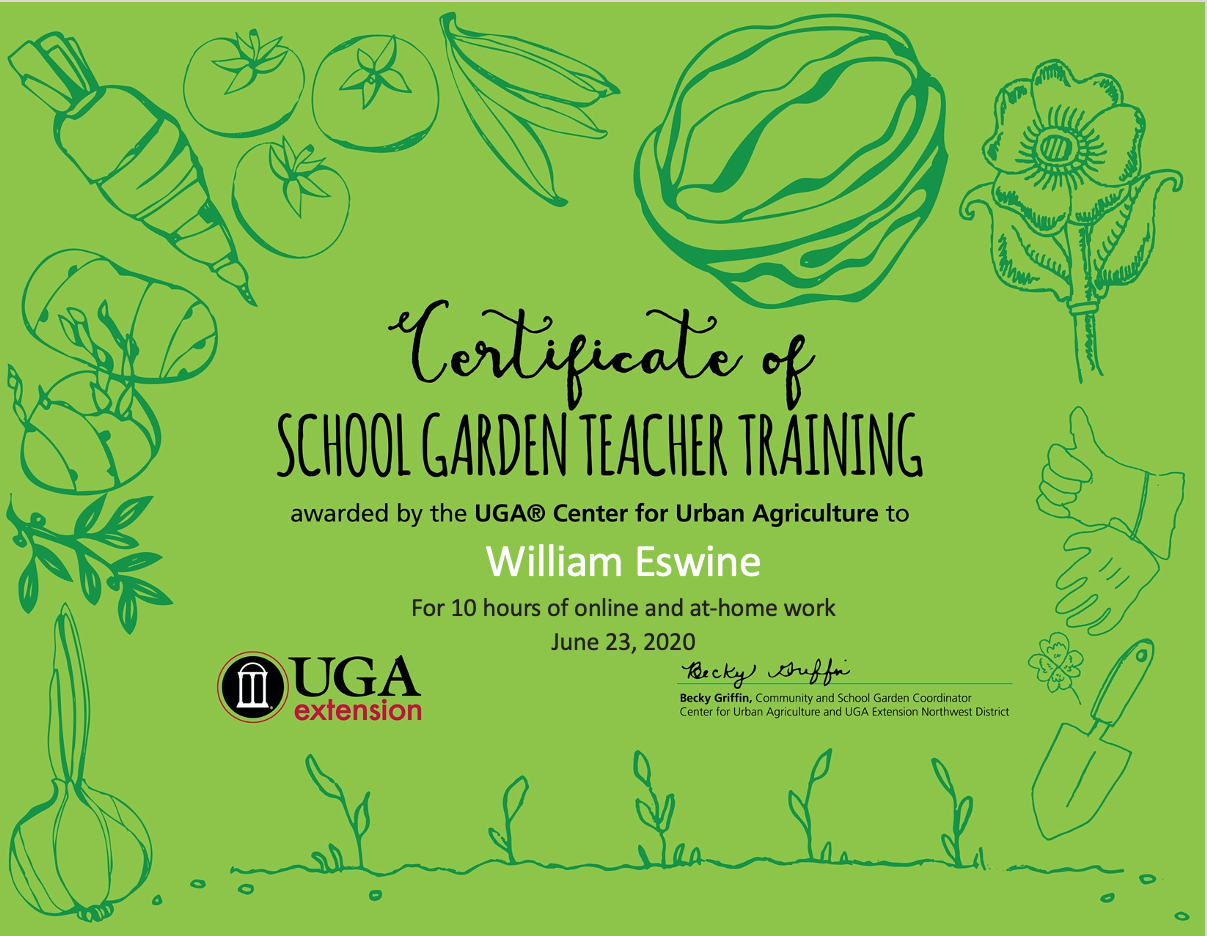- Griffin, Rebecca Hunt
Summary
On June 16th, University of Georgia Extension offered a hybrid teacher training event, part offered as an online webinar symposium and part as directed at-home activities. The online portion was a five-hour symposium featuring four school garden webinars and a question and answer lunch hour. After the educators attended the symposium they were given four at-home activities to complete. Each activity corresponded to a topic covered during the day: fruit plants in the school garden, seed saving, vermicomposting, and pollinators. After an educator completes the at-home activities, proof through photos is sent to the symposium coordinator and a Certificate of Completion is issued. These certificates are often required of teachers through their county education departments.
Situation
During the COVID-19 crisis, educators were looking for ways to receive continuing education during the summer. In-person opportunities were rare and educators indicated that many counties were not allowing their teachers to leave their counties for training. Also, many teachers indicated they were suffering from on-line training fatigue and did not want an all-day computer-delivered training. Counties often require their teachers to receive at least 10 hours of continuing education in the summer.
Response
Teachers were informally polled about what school garden topics would be of interest to them. Using the results four topics were chosen: fruit plants in the garden, seed saving, vermiculture, and pollinators. A webinar symposium was planned where each of the topics was taught for one hour with a one-hour lunch break between the first two webinars and the last two. The lunch break doubled as a question-and-answer and networking session. For each topic an at-home activity was created that allowed the teachers to expand what they learned during the webinar and to have something tangible to take back to the classroom. The activity instructions were housed on a webpage and the link was given to each participant. For fruit plants in the school garden, participants were given instructions on how to create a landscape plan and were asked to create one of their school garden with fruit plants added. For seed saving, participants were assigned the Jacob Cattle bean and asked to create a lesson plan tying that bean to a non-traditional school garden discipline like history, geography or literature. Tabletop vermiculture bin instructions were included so that educators could build one for their classroom use as part of the vermiculture portion. And, teachers were encouraged to participate in the Great Georgia Pollinator Census and asked to build a bee nesting box for their gardens for the pollinator webinar. A Certificate of Completion was made available for any educator who participated in all five hours of the symposium and completed all at-home activities, equivalent to 10 hours of work. Attendance at all webinars was not required as some educators were interested in only one or two topics. We had participants from the states of Alabama, Texas, Alabama, Virginia, South Carolina, and California as well as three participants from the Philippines.
Impact
Three hundred and seventy-six people registered for the symposium. An average of 255 people attended each webinar and an evaluation poll was given after each webinar. Ninety percent of participants indicated they were “probably likely” or “very likely” to use the information presented in the fruit plants in the school garden webinar in their school gardens. Eighty percent of participants indicated they were “probably likely” or “very likely” to use the information presented in the seed saving webinar in their school garden programs. Eighty-three percent of participants indicated they were “probably likely” or “very likely” to use the information presented to practice vermiculture in their school garden program. Finally, Eighty-eight percent of participants indicated they were “somewhat likely” or “very likely” to have their students participate in the 2020 Great Georgia Pollinator Census after receiving the information and training in the webinar. Participant Joan Khan wrote: “We absolutely loved your School Garden Symposium on June 16th, and the unique insight given by each of the presenters was priceless. We especially loved hearing about the missteps and personal anecdotes from you all as we listened and viewed the slides and live videos. Thank you for answering our questions and giving us some great resources that we may use as we continue to grow our Savannah Country Day School gardens.” Participant Anya Solomon-Coggin wrote: “This was really great!! Didn’t feel like 5 hours because it was so much useful information. All of us at Woodward Elementary in DeKalb County were in today, enjoyed it and look forward to getting started with these new tools and the census!” At this point educators are working towards their certificates; they were given a deadline of August 1st. To date we have had eight teachers already finish the at-home activities and receive their Certificates of Completion and we are aware of many more working towards that goal. We will follow up with the participants during the 2020-21 school year.
State Issue
Urban Agriculture
Details
- Year: 2020
- Geographic Scope: International
- County: Union
- Location: Georgia Mountain Research and Education Center, Blairsville
-
Program Areas:
- 4-H Youth
- Agriculture & Natural Resources
Author
Collaborator(s)
CAES Collaborator(s)
- Braman, George Rich
- Fuder, Joshua Graham
- Hoppers, Ashley
- Horne, Elizabeth Johnson
Non-CAES Collaborator(s)
- Rosann Kent
Extension Impact

